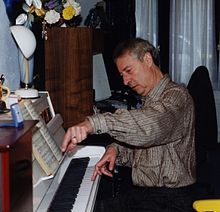Luc Ferrari
| Luc Ferrari | |
|---|---|
 |
|
| Background information | |
| Birth name | Lucien Ferrari |
| Born |
February 5, 1929 Paris, France |
| Died | August 22, 2005 (aged 76) Arezzo, Italy |
| Occupation(s) | Composer, musician, film director |
| Years active | 1950–2005 |
| Website | lucferrari |
Luc Ferrari (February 5, 1929 – August 22, 2005) was a French composer of Italian heritage.
Ferrari was born in Paris, and was trained in music at a very young age. He studied the piano under Alfred Cortot, musical analysis under Olivier Messiaen, and composition under Arthur Honegger. His first works were freely atonal. A case of tuberculosis in his youth interrupted his career as a pianist. From then on he mostly concentrated on musical composition. During this illness he had the opportunity to become acquainted with the radio receiver, with pioneers such as Schönberg, Berg, and Webern.
In 1954, Ferrari went to the United States to meet Edgard Varèse, whose Déserts he had heard on the radio, and had impressed him. This seems to have had a great effect on him, with the tape part in Déserts serving as inspiration for Ferrari to use magnetic tape in his own music. In 1958 he co-founded the Groupe de Recherches Musicales with Pierre Schaeffer and François-Bernard Mâche. He taught in institutions around the world, and worked for film, theatre and radio. By the early 1960, Ferrari had begun work on his Hétérozygote, a piece for magnetic tape which uses ambient environmental sounds to suggest a dramatic narrative. The use of ambient recordings was to become a distinctive part of Ferrari's musical language.
Ferrari's Presque rien No. 1 'Le Lever du jour au bord de la mer (1970) is regarded as a classic of its kind. In it, Ferrari takes a day-long recording of environmental sounds at a Yugoslavian beach and, through editing, makes a piece that lasts just twenty-one minutes. It has been seen as an affirmation of John Cage's idea that music is always going on all around us, and if only we were to stop to listen to it, we would realise this. Ferrari continued to write purely instrumental music as well as his tape pieces. He also made a number of documentary films on contemporary composers in rehearsal, including Olivier Messiaen and .
...
Wikipedia
